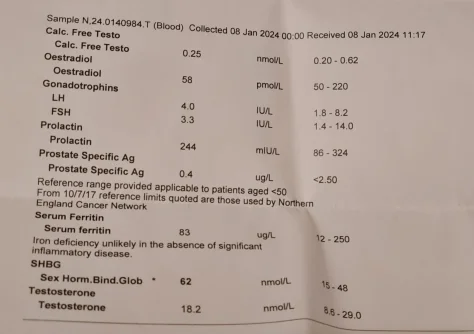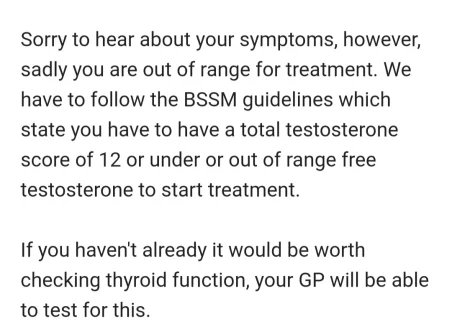whiting1986
Member
High guys. So I got my recent blood tests back from Endo.
He says my levels are fine but wanted to run through this forum to see if he's talking BS.
TT is 18.2 nmol/L or 525 ng/dL
FT is 0.25 nmol/ L or 7 ng/dL
I have got high SHBG which is at 62 nmol/L
Symptoms are....
No libido
No drive in life
Low mood
Anxiety has reduced a lot over the last few months.
Supplement stack...creatine, collegen with biotin, folinic acid(have COMT) hydroxy B12(have MTHFR) vit d3 with k2 4000iu
Diet is mostly animal based so beef patties, lots of eggs, avacados, feta cheese, chicken breast, sweet patatoes, natural yoghurt ans nuts, etc.
I would love to get people's Thoughts and there experiences with high shbg and low FT That's if mine is low.
I think I have tried almost everything to lower it and raise it so any input would be great thanks in advance
He says my levels are fine but wanted to run through this forum to see if he's talking BS.
TT is 18.2 nmol/L or 525 ng/dL
FT is 0.25 nmol/ L or 7 ng/dL
I have got high SHBG which is at 62 nmol/L
Symptoms are....
No libido
No drive in life
Low mood
Anxiety has reduced a lot over the last few months.
Supplement stack...creatine, collegen with biotin, folinic acid(have COMT) hydroxy B12(have MTHFR) vit d3 with k2 4000iu
Diet is mostly animal based so beef patties, lots of eggs, avacados, feta cheese, chicken breast, sweet patatoes, natural yoghurt ans nuts, etc.
I would love to get people's Thoughts and there experiences with high shbg and low FT That's if mine is low.
I think I have tried almost everything to lower it and raise it so any input would be great thanks in advance
















